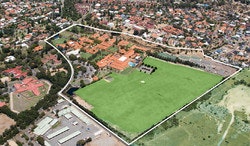Year 12 English General
The English General course focuses on consolidating and refining the skills and knowledge needed by students to become competent, confident and engaged users of English in everyday, community, social, further education, training and workplace contexts. The English General course is designed to provide students with the skills that will empower them to succeed in a wide range of post‐secondary pathways, including vocationally based training or the workforce. Students comprehend, analyse, interpret and evaluate the content, structure and style of a wide variety of oral, written, multimodal, digital and media texts. Students learn how the interaction of structure, language, audience and context helps to shape how the audience makes meaning. Both independently and collaboratively, they apply their knowledge to create analytical, imaginative, interpretive and persuasive texts in different modes and media.
The course develops students' language, literacy and literary skills to enable them to communicate successfully both orally and in writing and to enjoy and value using language for both imaginative and practical purposes. Students do not sit an external examination but do complete an external task set by the Authority.
Unit 3
Unit 3 focuses on exploring different perspectives presented in a range of texts and contexts:
- explore attitudes, text structures and language features to understand a text's meaning and purpose
- examine relationships between context, purpose and audience in different language modes and types of texts, and their impact on meaning
- consider how perspectives and values are presented in texts to influence specific audiences
- develop and justify their own interpretations when responding to texts
- learn how to communicate logically, persuasively and imaginatively in different contexts, for different purposes, using a variety of types of texts.
Unit 4
Unit 4 focuses on community, local or global issues and ideas presented in texts and on developing students' reasoned responses to them:
- explore how ideas, attitudes and values are presented by synthesising information from a range of sources to develop independent perspectives
- analyse the ways in which authors influence and position audiences
- investigate differing perspectives and develop reasoned responses to these in a range of text forms for a variety of audiences
- construct and clearly express coherent, logical and sustained arguments and demonstrate an understanding of purpose, audience and context
- consider intended purpose and audience response when creating their own persuasive, analytical, imaginative, and interpretive texts.
Assessment
The following types of assessments and weightings will be undertaken:
Responding: 60% | Creating: 40%
Reporting
The achievement for the unit will be reported as a College A - E grade. In addition, the student's approach to class work and behaviour will be reported via the usual key performance indicators.
Student Expectations/Homework
Students will be expected to complete approximately 1 hour of homework each week. This time should be spent consolidating material covered in class as well as any assigned tasks.
